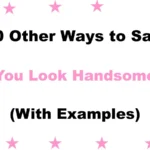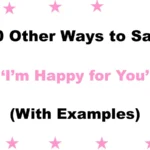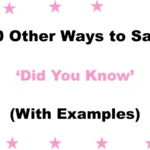Expressing gratitude with the right words can transform a simple “thanks” into a deeply personal and meaningful message. When you want to show someone you truly value their hospitality, choosing an alternative phrase can convey warmth and authenticity. Whether you’re leaving a friend’s gathering, wrapping up a business meeting, or saying goodbye after staying overnight, having a variety of expressions at your fingertips helps you connect on a more empathetic level.
In this article, you’ll find 30 unique alternatives to “Thanks for having me,” complete with definitions, detailed explanations, scenario examples, and guidance on when and how to use each one. Use these phrases to elevate your conversational style and leave a lasting positive impression. Ready to enrich your vocabulary and communicate with genuine care? Let’s dive in!
What Does “Thanks for Having Me” Mean?
“Thanks for having me” is a polite and heartfelt way to express gratitude for being invited, included, or welcomed into someone’s space, event, or experience. It’s often used to acknowledge a host’s kindness, effort, or hospitality, whether that’s at a dinner party, an interview, a meeting, or even a casual hangout.
The phrase conveys appreciation not just for the event itself, but for the thoughtfulness behind the invitation. It shows that you recognize the host’s gesture and value the opportunity to be part of the moment, making it a respectful and meaningful expression in both personal and professional conversations.
When to Use “Thanks for Having Me”
You can use “Thanks for having me” any time someone invites, hosts, or includes you in an event, meeting, or special occasion. It’s perfect for both personal and professional settings, such as after a dinner at a friend’s home, a guest appearance on a podcast, attending a company event, or participating in a team meeting.
This phrase is especially effective when you want to show appreciation for someone’s hospitality, time, or effort. Whether you’re wrapping up a virtual call or leaving a social gathering, saying “Thanks for having me” is a gracious and warm way to acknowledge inclusion and make others feel appreciated for welcoming you.
Is It Professional/Polite to Say “Thanks for Having Me”?
Yes, “Thanks for having me” is both professional and polite, making it a widely accepted phrase in a variety of settings. Whether you’re attending a business meeting, job interview, conference, or networking event, it conveys appreciation with a warm, respectful tone. While it’s casual enough for social gatherings, it’s also formal enough for professional environments—especially when paired with confident body language or a follow-up message.
If you’d like to sound more polished in formal contexts, you can opt for alternatives like “I appreciate the opportunity” or “Thank you for the invitation,” but overall, “Thanks for having me” is a thoughtful and courteous phrase that shows gratitude without being overly elaborate.
Pros and Cons of Saying “Thanks for Having Me”
Pros:
- Conveys genuine warmth and friendliness.
- Easy to remember and use in casual settings.
Cons:
- Can feel too informal in strict professional contexts.
- Lacks specificity about what you appreciated.
Synonyms for “Thanks for Having Me”
- I Appreciate Your Warm Welcome
- Thank You for Your Hospitality
- I’m Grateful for Being Here
- Thanks for Inviting Me
- I Value Your Kindness
- I’m Honored to Be Here
- I Feel Privileged to Join You
- Thank You for Including Me
- I Appreciate Being Part of This
- It Was a Pleasure to Attend
- Thank You for Making This Possible
- I’m Thankful for This Opportunity
- Thank You for Bringing Me Along
- I’m Delighted to Be Here
- Thanks for Welcoming Me
- Thank You for the Warm Reception
- I’m Appreciative of Your Invite
- Much Obliged for Your Kind Invitation
- Thank You for the Courtesy
- I’m Grateful for Your Company
- I Appreciate the Invitation
- Thank You for the Invite
- Thanks for Letting Me Share in This
- I’m Thankful to Join
- I Appreciate the Opportunity to Be Here
- Thanks for Having Me Around
- Thank You for the Chance to Participate
- I’m Grateful to Be Included
- Thanks for the Warm Embrace
- Thank You for the Warm Greeting
1. I Appreciate Your Warm Welcome
Definition: Acknowledging the host’s friendly reception.
Detailed Explanation: Highlights the initial warmth you felt at arrival.
Scenario Example: Arriving at a friend’s housewarming, you say this at the door.
Best Use: Informal gatherings where you want to emphasize the greeting.
Worst Use: Situations where no greeting occurred.
Tone: Warm and appreciative.
2. Thank You for Your Hospitality
Definition: Expressing gratitude for the overall care and provisions.
Detailed Explanation: Focuses on how well you were treated and looked after.
Scenario Example: After an overnight stay at a colleague’s home.
Best Use: Semi-formal visits and travels.
Worst Use: When no tangible hosting occurred.
Tone: Polite and gracious.
3. I’m Grateful for Being Here
Definition: Centering on your gratitude for inclusion.
Detailed Explanation: Emphasizes personal appreciation for being part of the event.
Scenario Example: Speaking at a panel discussion.
Best Use: Public speaking or group settings.
Worst Use: One-on-one casual meetups.
Tone: Sincere and reflective.
4. Thanks for Inviting Me
Definition: Simple acknowledgment of the invitation.
Detailed Explanation: Directly thanks the host for extending the invite.
Scenario Example: RSVP follow-up message after an event.
Best Use: Emails or texts.
Worst Use: After-the-fact, when the event is over.
Tone: Friendly and straightforward.
5. I Value Your Kindness
Definition: Highlighting the host’s generosity.
Detailed Explanation: Draws attention to the thoughtful gestures provided.
Scenario Example: After receiving a gift at a dinner party.
Best Use: When the host went above and beyond.
Worst Use: In strictly professional contexts.
Tone: Warm and heartfelt.
6. I’m Honored to Be Here
Definition: Conveying respect and privilege.
Detailed Explanation: Suits formal or ceremonial events.
Scenario Example: At an awards ceremony podium.
Best Use: Formal gatherings.
Worst Use: Casual get-togethers.
Tone: Respectful and gracious.
7. I Feel Privileged to Join You
Definition: Emphasizes exclusivity of the invitation.
Detailed Explanation: Suggests the event holds special meaning.
Scenario Example: Joining a high-profile networking event.
Best Use: Prestigious occasions.
Worst Use: Everyday social events.
Tone: Formal and appreciative.
8. Thank You for Including Me
Definition: Gratitude for being made part of a group.
Detailed Explanation: Highlights your acceptance into the circle.
Scenario Example: Being added to a collaborative project.
Best Use: Team environments.
Worst Use: Solo visits.
Tone: Collaborative and thankful.
9. I Appreciate Being Part of This
Definition: Acknowledges group membership.
Detailed Explanation: Focuses on the shared experience.
Scenario Example: Wrapping up a workshop.
Best Use: Educational or team events.
Worst Use: Personal visits.
Tone: Inclusive and positive.
10. It Was a Pleasure to Attend
Definition: Expressing enjoyment of the event.
Detailed Explanation: Emphasizes how much you liked the experience.
Scenario Example: After a conference.
Best Use: Professional events.
Worst Use: Informal hangouts.
Tone: Polite and upbeat.
11. Thank You for Making This Possible
Definition: Gratitude for arranging or enabling the event.
Detailed Explanation: Acknowledges the effort behind the scenes.
Scenario Example: Post-project celebration.
Best Use: Events requiring planning.
Worst Use: Spontaneous gatherings.
Tone: Respectful and grateful.
12. I’m Thankful for This Opportunity
Definition: Emphasizes gratitude for the chance itself.
Detailed Explanation: Ideal for career or personal growth settings.
Scenario Example: After an internship interview.
Best Use: Professional advancement contexts.
Worst Use: Casual social scenarios.
Tone: Professional and appreciative.
13. Thank You for Bringing Me Along
Definition: Acknowledges being included in an activity.
Detailed Explanation: Suited for outings or trips.
Scenario Example: After a weekend getaway with friends.
Best Use: Social adventures.
Worst Use: Formal events.
Tone: Casual and friendly.
14. I’m Delighted to Be Here
Definition: Conveys genuine pleasure.
Detailed Explanation: Highlights your enthusiasm.
Scenario Example: At a celebratory dinner.
Best Use: Festive occasions.
Worst Use: Solemn events.
Tone: Joyful and warm.
15. Thanks for Welcoming Me
Definition: Focuses on the act of reception.
Detailed Explanation: Similar to “warm welcome,” but more concise.
Scenario Example: Entering a new workplace.
Best Use: First meetings.
Worst Use: Farewells.
Tone: Friendly and appreciative.
16. Thank You for the Warm Reception
Definition: Emphasizes the overall friendly greeting.
Detailed Explanation: Highlights collective hospitality.
Scenario Example: After a team welcome event.
Best Use: Group settings.
Worst Use: Private visits.
Tone: Grateful and formal.
17. I’m Appreciative of Your Invite
Definition: Acknowledges the invitation itself.
Detailed Explanation: Direct and polite.
Scenario Example: RSVP to a networking mixer.
Best Use: Written communication.
Worst Use: After the event.
Tone: Polite and clear.
18. Much Obliged for Your Kind Invitation
Definition: A formal expression of thanks.
Detailed Explanation: Old-fashioned but respectful.
Scenario Example: Formal gala RSVP.
Best Use: Very formal events.
Worst Use: Casual gatherings.
Tone: Formal and courteous.
19. Thank You for the Courtesy
Definition: Highlights polite gestures.
Detailed Explanation: Focuses on small acts of kindness.
Scenario Example: When offered special assistance.
Best Use: Situations of extra care.
Worst Use: Generic thank-you.
Tone: Respectful and specific.
20. I’m Grateful for Your Company
Definition: Emphasizes enjoyment of time spent together.
Detailed Explanation: Focuses on companionship.
Scenario Example: After a coffee chat.
Best Use: One-on-one meetups.
Worst Use: Large events.
Tone: Warm and personal.
21. I Appreciate the Invitation
Definition: Direct thanks for inviting.
Detailed Explanation: Simple and to the point.
Scenario Example: Text response after being asked to lunch.
Best Use: Casual invites.
Worst Use: Formal contexts.
Tone: Friendly and concise.
22. Thank You for the Invite
Definition: Even more casual shorthand.
Detailed Explanation: Use among close friends.
Scenario Example: Group chat RSVP.
Best Use: Informal contexts.
Worst Use: Professional settings.
Tone: Casual and upbeat.
23. Thanks for Letting Me Share in This
Definition: Acknowledges shared experience.
Detailed Explanation: Emphasizes participation.
Scenario Example: After a brainstorming session.
Best Use: Collaborative environments.
Worst Use: Solo events.
Tone: Inclusive and thankful.
24. I’m Thankful to Join
Definition: Short and versatile.
Detailed Explanation: Works for many settings.
Scenario Example: Joining a webinar.
Best Use: Both formal and informal.
Worst Use: When more detail is needed.
Tone: Neutral and polite.
25. I Appreciate the Opportunity to Be Here
Definition: Professional and respectful.
Detailed Explanation: Highlights value of the moment.
Scenario Example: After a panel invitation.
Best Use: Career events.
Worst Use: Casual visits.
Tone: Professional and gracious.
26. Thanks for Having Me Around
Definition: Casual, friendly phrasing.
Detailed Explanation: Connotes comfort and familiarity.
Scenario Example: After hanging out at a friend’s place.
Best Use: Close friends and family.
Worst Use: Formal or new acquaintances.
Tone: Relaxed and warm.
27. Thank You for the Chance to Participate
Definition: Highlights active involvement.
Detailed Explanation: Focuses on your role.
Scenario Example: After being invited to speak.
Best Use: Interactive events.
Worst Use: Passive attendance.
Tone: Professional and engaged.
28. I’m Grateful to Be Included
Definition: Acknowledges inclusion.
Detailed Explanation: Emphasizes being part of the group.
Scenario Example: Joining a study group.
Best Use: Team or social circles.
Worst Use: Solo activities.
Tone: Inclusive and thankful.
29. Thanks for the Warm Embrace
Definition: Metaphorical gratitude for emotional welcome.
Detailed Explanation: Conveys deep warmth.
Scenario Example: Coming home after a long trip.
Best Use: Close friends and family.
Worst Use: Professional contexts.
Tone: Intimate and heartfelt.
30. Thank You for the Warm Greeting
Definition: Focuses on initial reception.
Detailed Explanation: Similar to welcome phrases but more formal.
Scenario Example: At a business conference entrance.
Best Use: Professional events.
Worst Use: Casual home visits.
Tone: Polite and warm.
Conclusion
Finding the right words to say “Thanks for having me” can turn a simple gesture into something truly memorable. Whether you’re writing a follow-up email, sending a thoughtful text, or expressing gratitude in person, choosing a more personal and meaningful alternative can deepen your connection and leave a lasting impression.
From heartfelt to professional, these 30 warm and thoughtful phrases help you communicate with sincerity, grace, and genuine appreciation. In moments where words matter, letting someone know you valued their invitation or inclusion isn’t just polite—it’s a reflection of kindness and respect. Use these alternatives to speak not just from habit, but from the heart.
FAQs
1: What does “Thanks for Having Me” really mean?
It’s a polite and sincere way to express gratitude for someone’s hospitality, time, or inclusion. Whether you’re attending a dinner, a meeting, or an event, saying “Thanks for having me” acknowledges the host’s effort and shows appreciation for the experience.
2: Is it okay to use this phrase in professional settings?
Yes, absolutely. “Thanks for having me” is a polite, respectful, and professional phrase. It works well in job interviews, team meetings, client visits, or after attending a networking event. If you want to tailor it more formally, alternatives like “I appreciate the opportunity” may suit business situations better.
3: Can I use these alternatives in an email or text?
Definitely. Most of the 30 alternatives are suitable for both spoken and written communication. For example, “I truly appreciated being included” is great for a follow-up email, while “It meant a lot to be there” feels warm and genuine in a text to a friend or family member.
4: How do I choose the right alternative for the situation?
Think about the tone you want to convey—formal, casual, warm, or heartfelt. For formal events or business settings, phrases like “Thank you for the opportunity” work best. For personal gatherings, softer phrases like “It meant so much to be part of it” are more meaningful.
5: What if I want to sound more heartfelt or emotional?
Choose an alternative that reflects your emotions, such as “It truly touched me to be included” or “I felt so welcomed and appreciated.” These phrases add a personal, emotional depth that “Thanks for having me” might not fully capture.

Mia Rose is a passionate Language Coach and Contributor at GrammarPeaks, where she specializes in practical grammar tips and language learning strategies. With a strong foundation in education and communication, Mia brings a friendly, approachable style to her writing. Her goal is to make complex grammar rules simple and usable for learners at any level, helping them grow in both confidence and fluency.





